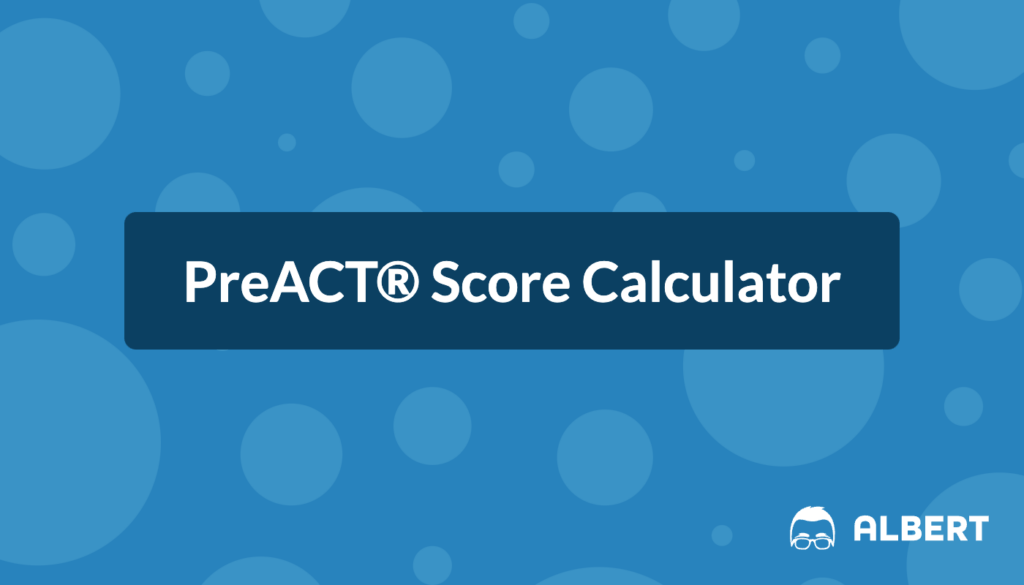Got an PreACT® exam coming up and not sure how you might do? Then you’re at the right place. Here is an interactive PreACT® score calculator to help you predict how your raw score would translate to your PreACT® scale score so that you can answer for yourself, “Is my PreACT® score good enough?”
PreACT® Score Calculator

Enter your scores
Results
/45
/36
/25
/30
Choose your score curve
Looking for PreACT® study materials?
Albert.io Practice Exam Distributions
We thought it would be helpful to bridge the gap between our PreACT® Score Calculator (above) with the original practice exams published on Albert.io. This way, you can see how your practice in Albert.io might translate into the score curves on the real exams. NOTE — These score distributions are ONLY relevant for the multiple-choice sections of Albert.io’s full-length practice exams. All of these practice exams are 100% original and can only be found on Albert.io (PreACT® English, PreACT® Math, PreACT® Reading, PreACT® Science)
What is PreACT®?
The PreACT® is a practice version of the ACT®, designed to help 10th graders prepare for the real thing. It mirrors the format and content of the ACT® but has fewer questions and a slightly shorter testing time.
The PreACT® tests you in four main areas: English, Math, Reading, and Science. Just like the ACT®, all questions are multiple-choice. It’s meant to give you a sneak peek at what to expect on the full ACT® and help you identify strengths and areas for improvement.
Another bonus? Your PreACT® results can help you estimate your future ACT® score. That’s why learning how to calculate your PreACT® score is so useful—it gives you a head start on ACT® prep and college planning.
How many questions are on the PreACT®?
The PreACT® has a total of 144 questions spread across four sections:
- English – 45 questions
- Math – 36 questions
- Reading – 25 questions
- Science – 38 questions
These sections follow the same structure as the ACT®, just with fewer questions overall. The shorter format helps students build confidence while still getting a feel for the real exam.
Each correct answer counts toward your raw score—and since there’s no penalty for guessing, it’s always worth answering every question.
How long does the PreACT® take?
The PreACT® takes about 2 hours and 10 minutes to complete. Here’s how the timing breaks down for each section:
- English – 30 minutes
- Math – 40 minutes
- Reading – 30 minutes
- Science – 30 minutes
There’s also time built in for instructions and breaks, so you’ll want to plan for a bit more than two hours overall.Because it’s shorter than the ACT®, the PreACT® is a great way to ease into the experience of a timed standardized test—without the full pressure of the real thing.
What is the PreACT® out of?
The PreACT® is scored on a 1–35 scale, slightly different from the ACT®, which goes up to 36. After you take the test, each of your four section scores—English, Math, Reading, and Science—is converted from a raw score (how many questions you got right) into a scale score between 1 and 35.Your composite score is calculated by averaging those four scale scores. For example, if you scored a 28 in English, 25 in Math, 30 in Reading, and 27 in Science, your PreACT® composite score would be:(28+25+30+27)÷4=27.5→Rounded to 28So while the PreACT® is shorter, the scoring system works just like the ACT®. That makes it a useful tool for estimating how you might perform on the actual test.
What is a good PreACT® score?
A good PreACT® score depends on your goals, but here’s a general breakdown:
- Above 30 – Excellent! You’re in great shape for the ACT®.
- 25–29 – Strong score, with room to grow even more.
- 20–24 – About average and a solid starting point.
- Below 20 – Totally okay! Think of it as a benchmark to guide your study.
Since the PreACT® is designed to predict your future ACT® score, think of your composite score as a snapshot of where you are now. It helps you spot your strengths and figure out which subjects need more practice.Colleges don’t see your PreACT® score, so use it as a low-stakes way to prepare, set goals, and make your future ACT® score even better.
What is a good PreACT® score for a freshman?
If you’re taking the PreACT® as a freshman, first of all—nice work! You’re ahead of the game.
For 9th graders, a “good” score might look a little different than it does for sophomores. Most students haven’t covered all the material yet, so the average tends to be lower. In general:
- 22 or higher – Great start for a freshman
- 18–21 – Solid, with plenty of time to improve
- Below 18 – Totally normal! Use it as a learning tool
Freshman-year PreACT® scores are all about building a foundation. The goal isn’t to be perfect—it’s to get familiar with the test format and start developing your skills early. With time and practice, you’ll be in a great spot for the ACT® down the road.
Why should I use this PreACT® score calculator?
This PreACT® score calculator makes it easy to figure out where you stand. Instead of guessing or waiting for official results, you can quickly convert your raw scores into scale scores to estimate your composite score.
Here’s why it’s helpful:




Whether you’re using an official practice test or a classroom version of the PreACT®, this calculator helps you understand your results—and take the next step with confidence.
Looking for extra PreACT® practice?
Albert provides extensive PreACT® practice with detailed explanations and full-length practice tests.
Interested in a school license?
➜ SAT® & ACT®
➜ AP®
➜ ELA, Math, Science, & Social Studies
➜ State assessments
Options for teachers, schools, and districts.

